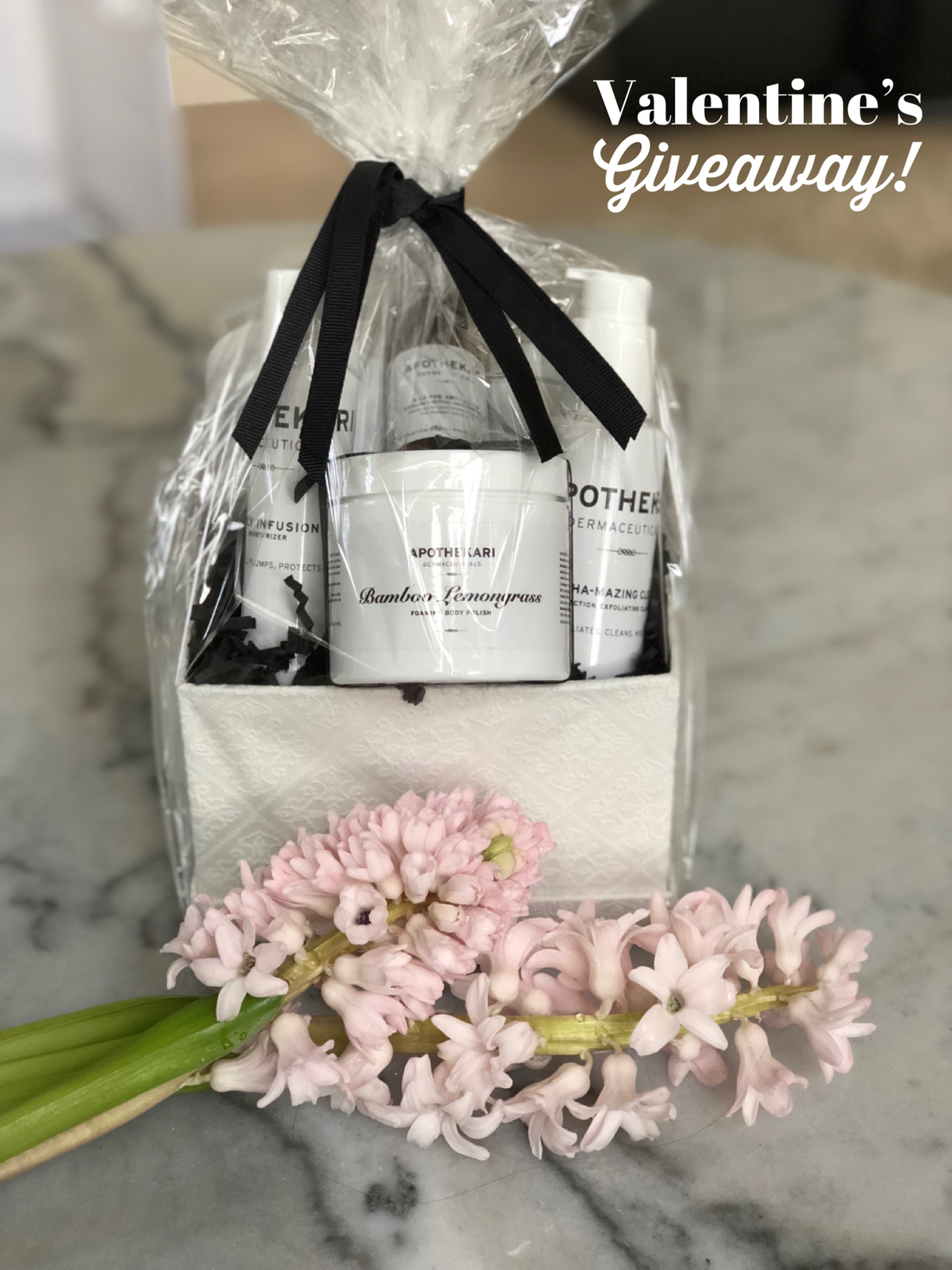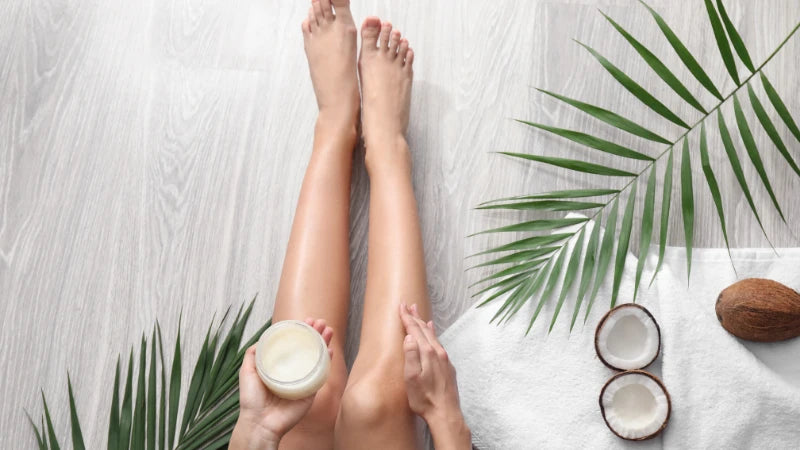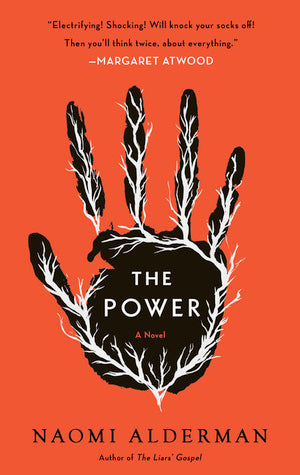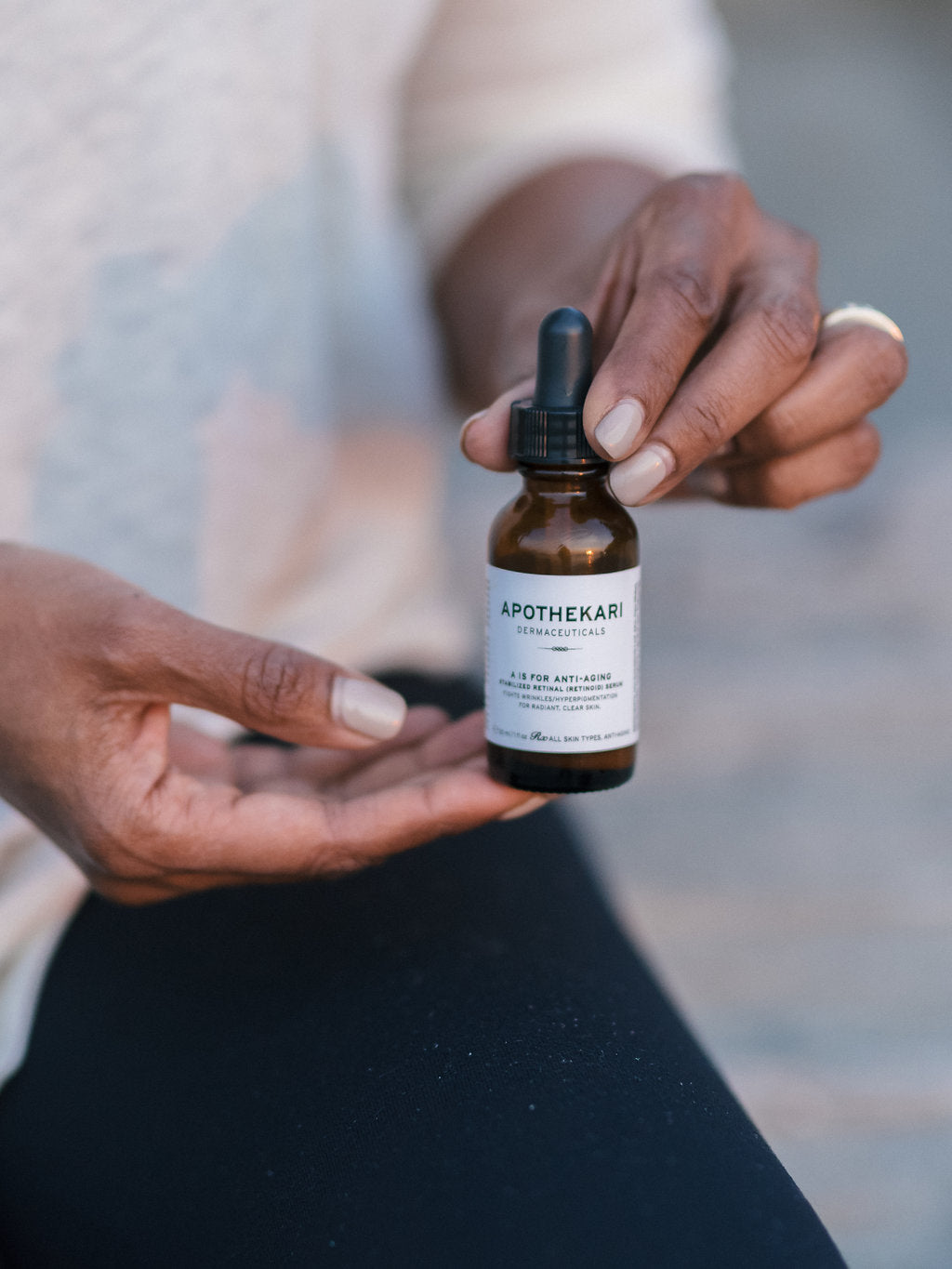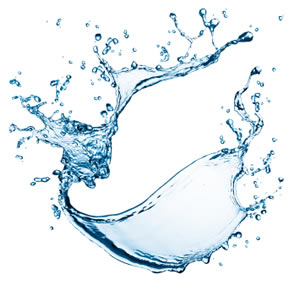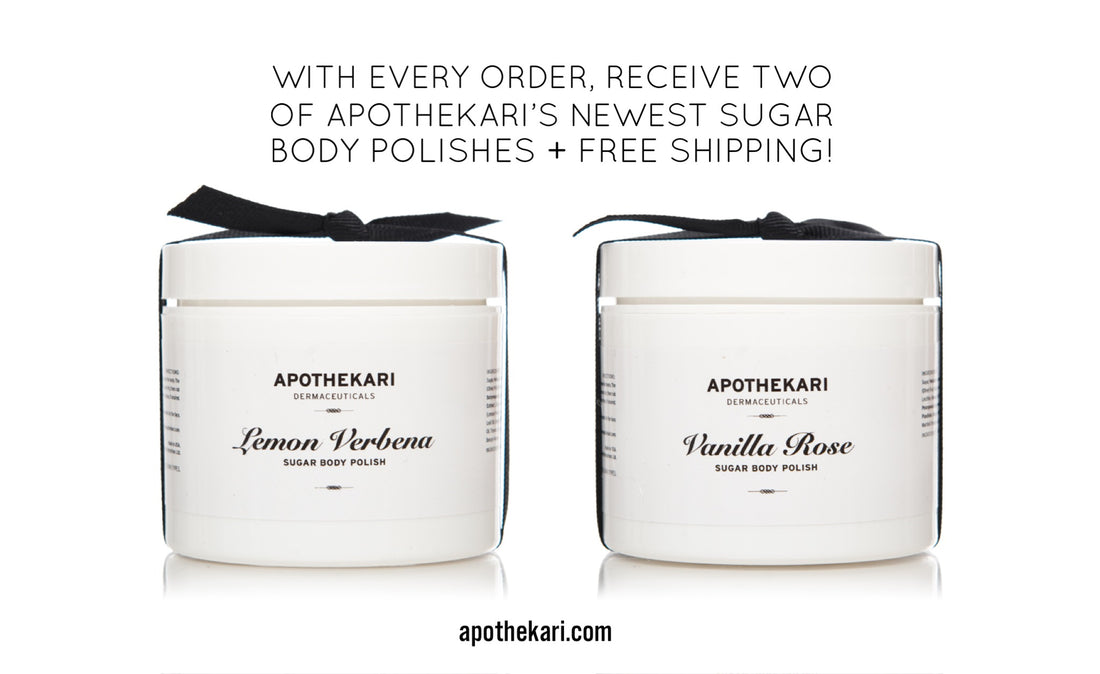Blog
Morning Skin Care Vs Evening
Your skin is exposed to UV rays, pollution, dirt and makeup. You may spend a good chunk of time talking on your cell phone, exposing your face to bacteria. For this reason, a morning skin care routine should be protective, helping to defend your skin against damage. At night, once you get rid of the dirt and makeup on your face, the scariest thing you’ll have to contend with is your pillowcase so make sure to change it regularly. This is the time when your skin (and your body) goes to work in resting, repairing and prepping for the next day. Shop All Apothekari Is It Better to Do Skin Care In the Morning or Night? To support your skin during both periods, you need to look after your skin both in the morning and night. The regimens are different but they don’t need to be complicated. In this post we show you how. Why Is Skin Care Better at Night? (it’s not…) At night, focus on cleansing and nourishing your skin. Choose products, that can help your skin to repair itself and even help slow down the aging process. Here’s what to do: Cleanse. Choose a gentle formulation that won’t strip away skin’s natural oils. Depending on your skin type, opt for one that is foaming – AHA-Mazing Clean Cleansing Gel – or creamier, like our Cloud Nine Foaming Cleansing Crème. If you enjoy using cleansing oils and balms, they are an effective way to help remove make-up and can be incorporated as part of a double cleanse method by following with a foaming cleanser after. Prevent. Ingredients including peptides, retinoids and antioxidants help to boost collagen and elastin production, tell your skin cells to behave normally and combat inflammation. We consider retinoids essential to healthy and youthful skin, but they are light sensitive so should be used at night. Apothekari A is for Anti-Aging contains retinaldehyde and niacinamide to boost collagen production, brighten skin tone and reduce the appearance of wrinkles and fine lines. Treat/Correct. Whether a serum, cream or lotion, this is a good time to apply treatments that can help to fix issues unique to your skin: For extra hydration, apply a moisturizer like our Daily Infusion Moisturizer, which hydrates and plumps skin. For hyperpigmentation, apply skin lightening agents including Vitamin C, niacinamide, retinoids, etc. Yes, you can use our Bespoke Vitamin C serum at night too! For eye care, seek out formulations to help combat puffiness, dark circles and crow’s feet. Consider Apothekari Firming Eye Gel, featuring Vitamin C. For wrinkles and fine lines, the retinoid or peptide formulation used in step 2, for prevention, has you covered. For sun damage, a combination of skin lighteners/brighteners and retinoids can help to reverse the damage. For oily skin, apply exfoliating toners or serums to help manage sebum production and reduce blemishes. Is Morning Skin Care Necessary? (um, yes…) Your morning skin care routine differs from that of your evening one in a few different ways: Cleanse. (Optional) In the morning, we consider this step optional, especially if your skin is dry to normal. It’s one step that I skip and boils down to a matter of personal preference. To cleanse or not to cleanse – this one’s up to you. Protect. The sun’s UV rays are responsible for more than 85% of skin aging. For this reason, the most important skin care product you’ll ever need is sunscreen. Use it daily, year round and you’ll reap the rewards. Watch out for our Shade SPF 30 coming soon! Prevent. It’s always good to try and prevent bad things before they happen so this step focuses on just that. Antioxidants, including Vitamins A, C and E, ferulic acid, pomegranate seed oil, astaxanthin and green tea are backed by sound science to support their efficacy preventing skin damage associated with free radicals and UV rays. Antioxidants can also boost the effectiveness of your sunscreen. Apply antioxidants in the morning to battle the daily assault of pollution and ultraviolet rays and at night to help boost collagen production and fight against factors that age skin.Apothekari Bespoke Vitamin C 10% or 15% are our made to order high potency Vitamin C serums containing a range of antioxidants including L-ascorbic acid, ferulic acid, astaxanthin, pomegranate seed oil and green tea extract. It also features hyaluronic acid and propanediol to moisturize. Treat/Correct. As with your PM routine, your morning routine should incorporate treatments and ingredients that will help manage your particular skin issues. Revisit those and include them if you feel necessary. Not too complicated, I hope! Does your morning skin care routine differ from the one at night?
Learn moreHappy Family Day, BC!
Happy Family Day, BC! Falling on the second Monday of February, British Columbians celebrate Family Day, taking extra time to enjoy activities with their loved ones – celebrating family life and the importance of spending time with family. Throughout the province and across the Lower Mainland, family-friendly events and activities have been organized, many for free. It’s the hope that many families will take this opportunity to discover areas of British Columbia that are new to them, or to rediscover familiar places. The Vancouver Sun lists a range of activities that can be enjoyed by you and your family. A few that have grabbed my attention? The Sea to Sky Gondola . With lift tickets at 50% off, this is a perfect way to enjoy outdoor activities including snow-tubing, and children’s activities plus face-painting and live music. Family Day at Fort Langley. I still recall spending lovely weekends here when our children were younger. Take in the traditions of the families at Fort Langley – from varied backgrounds like Scottish, Hawaiian, First Nations and Metis and enjoy the feature presentation on First Nations resources, make some Scottish bannock, or challenge your skills playing ‘Ulu Maika – a game meant to train Hawaiian warriors. Family Fun on the Farm (Southlands). Which child wouldn’t enjoy spending a day on a working farm, meeting the chickens, goats, sheep, horses, and ponies, including pony rides. Enjoy roast marshmallows on the bonfire. Family, derived from the Latin, familia, is a group of people affiliated either by by birth, marriage or other relationship) or co-residence. Today, the word “family”, is also used to create more inclusive categories such as close friends, community, nationhood, global village, and humanism. Whoever you spend Family Day with and however you define ‘family’, Happy Family Day, BC!
Learn moreA Valentine's Day Giveaway
For Valentine’s Day this year, we are sharing the love! All purchases online at Apothekari.com between February 11 – 18th qualify for an entry into our prize draw featuring over $200 of Apothekari products. Follow along on social media (Facebook and Instagram – links below) for additional chances to win! Our gift basket contains the following: A is for Anti-Aging Serum. One of our top sellers at Apothekari! Daily Infusion Moisturizer. Not too light and not too heavy, this Cinderella of moisturizers is very popular for a reason. AHA-Mazing Clean or Cloud Nine Cleanser. Depending on your skin type or needs, you may choose one of our two cleansers. Bamboo Lemongrass Foaming Body Polish. Once you try this, you’ll never want to take a shower without it! Exfoliates and cleanses for the softest, smoothest skin, ever. Vanilla Rose Sugar Body Polish. Fine sugar body polish scented with floral notes of rose and vanilla. Lemon Verbena Sugar Polish. Fine sugar polish with a vibrant and refreshing citrus scent. Retail value: $218 Contest Closes: February 18th and winner will be drawn on February 19th. Good luck!
Learn moreCoconut Oil in Skin Care; The Good and the Bad
Is it ok to use coconut oil in skin care routines? Coconut oil is definitely having its time in the spotlight these days—whether for its lauded nutritional qualities or wellness benefits, you can’t miss its virtues being sung from the top of many rooftops. More in this post. Shop All Apothekari Coconut oil is produced by extracting the oil from the meat of mature coconuts. It has a high saturated fat content and is a darling of the ‘natural world’ whose advocates suggest we embrace it as part of our diet. However, many organizations including the World Health Organization, the United States Food and Drug Administration, American Heart Association and Dietitians of Canada advise that its consumption should be limited or avoided. The concern is that it increases both the amount of high-density lipoprotein (HDL, or good)) cholesterol and low-density lipoprotein (LDL, or bad) cholesterol, which may increase the risk of cardiovascular disease. We’ll leave the nutritionists to battle it out about the oil’s benefits and risks when it comes to your health, but when it comes to coconut oil in skin care, there are advantages. Coconut Oil In Skin Care: Bad? When it comes to skin care, many a blogger, model, and online commenter, suggest that coconut oil is an amazing do-it-all ingredient for your skin, capable of moisturizing it, cleansing it, clearing it up and delivering radiant goodness. It’s made up of medium chain fatty acids and contains vitamin E, proteins, lauric, capric and caprylic acids, which deliver anti-bacterial and anti-fungal properties and can offer skin benefits. Its high saturated fat content makes coconut oil very hydrating so dry skin types benefit quite well and it’s also been shown to soothe mild cases of eczema. Coconut oil is great for some skin types and some uses, but it’s not a cure all and it’s not for everyone. It is highly rated on the comedogenic scale, sitting at 4 on a scale of 0 – 5. This means that coconut oil can clog pores, which is problematic if you have oily or acneic skin. The comedogenic effect varies amongst individuals and it is possible for some individuals to tolerate it without any issues. Others may go for months before experiencing a breakout while it’s also possible to react almost immediately. If you want to give coconut oil a try, go slow and be prepared to drop it out of your routine if your skin doesn’t like it. Is Coconut Oil Good in Skincare Products? It’s probably best to skip coconut oil in skincare products for the face, but when it comes to body care, it’s not a bad idea at all. When applied to the body and scalp, coconut oil can be hydrating. Slather it on rough and dry feet at night and then don a pair of socks to wake up with softer, smoother tootsies by morning. You can find coconut oil in lots of body polishes and scrubs, where it’s often combined with other skin softening ingredients—it can help to elevate your bath-time routine! Are you a fan of coconut oil when it comes to skin care?
Learn moreBook Reviews January 2018
I offer three(ish) book reviews this January. All are fiction – two are book club picks and the other is one that grabbed me due to its subject matter. While many people veer toward non-fiction books, I tend to indulge in fiction. I spend so much time thinking and analyzing during the days that when it comes to relaxing, I need a bit of escapism. I don’t have a preferred genre, gravitating towards a range of categories including crime stories, mysteries, science fiction and best sellers. These days, I’m enjoying historical fiction more because history is fascinating and helps to give us an appreciation for how we got to where we are today. The break over the holidays left me with some good downtime and so I was able to get through two novels. The Power by Naomi Alderman. Our last pick for book club, this dystopian novel is about teenage girls who discover that they hold a new power. The book focuses on the abuse of power, no matter who wields it. It also sheds light on the imbalance of male-female interactions and the battle of the sexes. A very original take on gender politics, it takes into question whether the fundamental differences between men and women are due to nature or nurture. Kind of kooky and highly entertaining, I absolutely loved the concept, which feels oh so relevant in these times. Can’t wait to dissect this one at book club! Hum If You Don’t Know the Words by Bianca Marais. Having been born in South Africa and moved to Canada in the 1970s, when I was seven, this book called my name. Set in Apartheid-era South Africa, this is the story of a ten-year-old white girl living with her parents in 1970s Johannesburg and a Xhosa woman in a rural village in the Bantu homeland. Both their lives have been built upon the division of race, and a chance meeting occurs as a result of the Soweto Uprising, in which a protest by black students ignites racial conflict. Told through alternating perspectives, the narratives capture the emotions and tensions at the heart of Apartheid-era South Africa. Although I have long been away from South Africa, the country and its people will forever remain in my heart. Marais’ novel was an emotional read. Sing Unburied Sing by Jesmyn Ward. The last book on my list is on the New York Times Book Review’s 10 Best Books of 2017 and one I’ve yet to read. Set on the Gulf Coast of Mississippi, it is reviewed as “a ‘road novel’, a slender epic of three generations and the ghosts that haunt them, and a portrait of what ordinary folk in dire circumstances cleave to as well as what they — and perhaps we all — are trying to outrun.” It’s our most recent book club pick and I’m looking forward to reading this one during January’s grey and rainy days. What have you been reading this winter? Any book reviews to share?
Learn moreExercise Skin. Yup, They're Related
Exercise Skin. You may not think these two things are related, but new research shows that exercise benefits not only our overall wellness but that of our skin as well. In fact, in addition to help skin look younger, it may also even reverse skin aging in people who start exercising late in life. Aging leads to many unwanted changes in our skin. Wrinkles, crow’s feet and sagging make us look older due to changes occurring within the various layers of our skin. After about the age of 40, our stratum corneum, the outermost, protective layer of skin that we can see and feel, starts to thicken. Composed mainly of dead skin cells and a little bit of collagen, it gets drier and flakier. At the same time, the dermis, located underneath the stratum corneum and epidermis, starts to lose skin cells and elasticity and begins to thin. The result is more translucent skin and often, a more saggy appearance. The changes above occur as a result of the aging process and don’t take into account general lifestyle particulars such as diet, sleep, stress or sun exposure. Are skin changes inevitable as we age? Recently, researchers investigated just this. A team at McMaster University in Ontario found that premature aging in nearly every organ in the body was completely prevented in mice that ran on a treadmill three times a week for five months. These mice were genetically engineered to age faster due to a defect in their mitochondria — the cellular powerhouses responsible for generating energy for nearly every cell in the body. Mitochondria are unique in that they have their own DNA. It has been thought that lifelong accumulation of mitochondrial DNA mutations lead to energy crisis that result in a progressive decline in tissue and organ function, ultimately resulting in aging. But the study on genetically-disadvantaged mice found those who had endurance exercise training three times a week looked as young as healthy mice while their sedentary siblings were balding, graying, physically inactive, socially isolated and less fertile. One of the lead authors of the study, Adeel Safdar, said: “I believe that we have very compelling evidence that clearly show that endurance exercise is a lifestyle approach that improves whole body mitochondrial function which is critical for reducing morbidity and mortality. Exercise truly is the fountain of youth.” Co-author Jacqueline Bourgeois said: “The recipe for healthy aging is very simple, and that’s exercise. The problem is that it is most people find it a difficult recipe to follow.” The study was taken a step further looking at people aged 65 and older. Exercise skin changes at a microscopic level were observed when exercise was introduced to participants for 30 minutes three times a week on a stationary bike – not much. To eliminate changes attributed due to UV exposure, skin that had not been frequently exposed to the sun was examined. The results? Skin appeared 20 to 30 years younger under the microscope after three months. The correlation between exercise skin is not completely clear, but researchers suspect that certain substances are also involved in the skin changes related to exercise. There’s no evidence that exercise reverses wrinkling and other damage from the sun, but it’s incredible to consider all of the ways in which exercise changes our bodies, including that of our skin. So…Get moving! Your health AND your skin will thank you.
Learn moreRetinol. 5 Myths Busted
Retinol and its relatives retinaldehyde, retinyl palmitate and prescription forms including retinoic acid, tazarotene and adapalene, is one of the most effective skin care ingredients to include in your skin care arsenal. Yet, despite the popularity of this effective class of ingredients, there are many misconceptions regarding its use. In this post we’ll look at 5 of the most common ones in an effort to set things straight. What is Retinol? Retinol and other derivatives all come from Vitamin A. It and its related compounds have been around for decades and many studies have shown consistently positive results on skin, including: Improving the skin’s texture Minimizing fine lines and wrinkles Delivering an even skin tone Reducing skin oiliness Managing blemishes Retinoids accomplish this by boosting collagen synthesis and increasing skin cell turnover (helping to speed up the development of new skin cells as we age). You’ll notice an ‘exfoliating’ effect, unclogged pores and less dry, flaky skin upon regular use of retinoids. Retinaldehyde, found in our A is for Anti-Aging Serum, also has anti-bacterial activity, making it a valuable addition in the management of acne. Below, I am setting the record straight on 5 commonly held myths regarding retinol: 5 Retinol Myths 1. Retinol (retinoids) Exfoliates The peeling and redness that accompanies some retinoids is the result of skin irritation and not true ‘exfoliation’. It is also the result of increased skin cell turnover. Despite the painful period of dealing with the peeling, this action is what helps make skin look so good. Build use gradually or try a milder or less sensitizing form of retinoid, like retinaldehyde to minimize this reaction. 2. Don’t Apply Retinoids Around Your Eye This recommendation comes from the belief that under eye skin is extremely sensitive. While it is indeed sensitive, studies have shown that people who apply retinoids right up to the eyes get the best results. As with all new skin treatments, do a patch test first, start slowly and back off if skin becomes very red and irritated. 3. Stop Applying Retinol if Your Skin Gets Irritated Initial skin irritation is part of the process and skin tends to adapt after a few weeks so unfortunately, you may have to put up with it. We’re talking here, about light peeling, increased dryness and some redness. With skin that experiences significant discomfort, discontinue use. Retinaldehyde is the least irritating form of retinoid, yet still delivers results. 4. Use the Strongest Retinoid You Can Find You don’t need to use the most potent retinoid (prescription forms like retinoic acid) to obtain benefits such as increased collagen production and skin cell turnover. While you may get faster results, it’s also true that you may also experience more irritation. This is something I have personal experience with. About to give up with retinoids due to irritation, peeling and redness from various prescription forms, along with non-prescription retinol, I found that my skin tolerated and liked, retinaldehyde very much. In fact, most customers tolerate A is for Anti-Aging very well, with minimal skin irritation. 5. You Should Stop Using Retinol in the Summer While retinol is light sensitive (it breaks down upon exposure to sunlight), there is no reason to stop using it in the summer. You can use retinol year round but always apply at night to ensure that it doesn’t degrade. Diligently apply an effective broad spectrum sunscreen during the day (SPF 30, at least) and you won’t have anything to worry about. Caveats There are a few: Don’t use retinoids if you are pregnant or breast-feeding. Although probably safe, there have been links to birth defects with the use of Vitamin A. Don’t layer retinoids with benzoyl peroxide and alpha hydroxy acids, which may deactivate them. Use caution during waxing, as skin may experience excessive redness with retinoid usage. Don’t use a retinoid for several days before a treatment. A very small amount of individuals have ultrasensitive skin and can never tolerate a retinoid. If you’re one of these people, try using a gentle exfoliation treatment once or twice a week and be extra careful to use sunscreen regularly. Retinoids. What do you say?
Learn moreWater in Cosmetics – Yay or Nay?
When it comes to water in cosmetics, you’ll find this ingredient listed in every type of personal care product – lotions, cleansers, deodorants, make-up, shampoos, sunscreens, etc. Do an internet search for the use of this common skin care ingredient and you’ll find differing opinions regarding its usefulness in formulations. In this post, I’ll cover the rationale behind incorporating water in cosmetics and let you decide if it makes sense or not. Water in Cosmetics – Why? Many individuals and companies will dispute the use of water in personal care products for many reasons with the main argument being that it is a cheap filler in treatments. Yet from a formulation and benefits perspective, water is important when it comes to cosmetics for several reasons: It helps to dissolve many ingredients that are beneficial to skin. Without water, you’d have to make do without many skin beneficial ingredients or be happy with a gritty, unpleasant texture. Water aids in the formation of emulsions – preparations in which oil and water are combined together to form creams and lotions. Depending on the ratio of oil to water, these may be called oil-in-water or water-in-oil emulsions. Emulsions produce lighter feeling and less greasy textured formulations than those that contain oil alone. More water equals a lighter textured product and less results in a more heavily textured one. It helps to replenish moisture in the skin. What Type of Water Is Used in Cosmetics? The type of water in cosmetics isn’t every day, regular tap water. It has to be free of microbes, metals and particulates that not only potentially can contaminate the end product but also wreck its stability. For this reason, formulations should contain distilled or deionized water which is free from contamination. What About the Consumption of Water for Maintaining Healthy Skin? You’ll come across many recommendations advocating that the consumption of adequate water – often eight to 10 glasses per day – is the secret to radiant skin. In fact, beauty magazines and beauty bloggers never tire of this as a way to improve your skin’s appearance and even eliminate wrinkles. While nobody would dispute that adequate water intake is important for your health, there is little, if any, scientific evidence that proves drinking a lot of water has any skin benefits at all. In fact, the water you consume will reach all your organs before it gets to your skin. Our skin, via its outermost layer, the stratum corneum, is designed to prevent water loss. Yet guzzling water isn’t necessarily going to make its way to your skin. The application of topical treatments with ingredients that include occlusives (prevent water from evaporating from the skin into the environment) and humectants (draw water into the superficial layers of skin) is your better bet for efficacy. Apply a hydrating moisturizer immediately after washing, bathing or showering to help lock in the moisture. As for the consumption – go ahead. Drinking water will do your body good; just don’t expect it to transform your skin. The next time you pick up a container and read the ingredients to see water at the top, you’ll know why this skin beneficial ingredient is included. Water is included in several of our Apothekari formulations including Daily Infusion Moisturizer, our Bespoke Vitamin C Serums and A is for Anti-Aging. They are not there just for show! Shop All Apothekari
Learn moreApothekari Gift Guide 2017
Holiday Gift Guide 2017 We’re into the first week of December already and if you’re anything like me, you may be a bit behind on your gift shopping. To make things easier, we’ve put together a list of gifts that may help relieve some of the stress. While we can’t guarantee that your purchase will arrive in time for Christmas, you can choose to pick up locally in Vancouver at Pure Pharmacy on Oak Street (option and details available at checkout) if that makes sense for you. Come Say Hello at The Bar Method Pop-Up! If you’d like to check out a bar class, shop from Apothekari (we’ll have testers on hand too) and support the Vancouver Food Bank through the Bar’s annual holiday Bar-a-thon food and toy drive, visit us during the Bar’s pop-ups: December 9th: 8:00 am – 12:30 pm West Vancouver, Marine Drive, Suite 250, West Vancouver, BC V7V 1J4 (604) 925-6199 December 16th 8:00 am – 1:30 pm Yaletwon. 837 Beatty Street, Suite 201, Vancouver, BC Phone: (604) 681-6188 We look forward to seeing you! Visit The Bar Method for more information. Now on to that Gift Guide… 1. For Someone Who Loves Bath-time Our range of sumptuous bath products are designed to exfoliate, moisturize and cleanse skin. Consider the following: Lemon Verbena Sugar Body Polish. A new addition to our online store, this sugar polish has a bright, aromatic citrus scent and is ideal for aromatherapeutic body treatments or a little pampering in your bath. Unlike most sugar-based scrubs, our body polish is smooth and never drips excess oil, so it’s easy to apply. Made with a blend of natural butters, this body exfoliator leaves the skin feeling soft and well-moisturized yet not greasy. Vanilla Rose Sugar Body Polish. New, like the Lemon Verbena Sugar Body Polish, Vanilla Rose boasts a modern and subtle scent of rose along with a faint hint of vanilla. It too, is ideal for aromatherapeutic body treatments or a little pampering in your bath. Unlike most sugar-based scrubs, our body polish is smooth and never drips excess oil, so it’s easy to apply. Made with a blend of natural butters, this body exfoliator leaves the skin feeling soft and well-moisturized yet not greasy. Our Shea Body Butter is made with organic shea butter and infused with healing herbs, fresh oils, natural vegetarian waxes and an intoxicating blend of essential oils to heal dry, cracked and callused skin. This extra-rich, protective crème is made with the highest quality organic shea butter from Africa. It penetrates deeply to heal dry, cracked, and callused skin and is also excellent as a daily hand crème, aiding in the health of cuticles and nails. Bamboo Lemongrass Foaming Body Polish. Let our Bamboo Lemongrass Foaming Body Polish revitalize and invigorate your skin and your senses with walnut shell powder, powdered bamboo and a light, refreshing essential oil blend of lemongrass, mimosa, and litsea! This exfoliating polish also comes with some light foaming action, leaving your skin feeling soft and smooth and you feeling refreshed! Our body treatments are packaged in gift sets for extra savings! 2. For Someone Serious About Skin Care Consider the gift of great skin for someone who is concerned about keeping it as healthy and youthful as possible. Apothekari A is for Anti-Aging, our top selling serum is everyone’s favorite because it’s formulated with retinaldehyde – a super gentle yet highly effective form of retinoid PLUS niacinamide – soothing, anti-inflammatory and hyperpigmentation busting. This treatment receives rave reviews from our customers and is a must have for anyone who wants skin that glows. Bespoke Vitamin C Serums. Available in both a 10% (for newbies or those with sensitive skin) or 15% concentrations, our hydrating serum contains Vitamin C as L-ascorbic acid plus a host of skin beneficial antioxidants to deliver protection from free radicals that can cause skin damage. Apply every morning for brighter skin. AHA-Mazing Clean Exfoliating Cleansing Gel is ideal for everyday use for all skin types (except sensitive). It will help to improve skin’s overall appearance, with all three major ingredients working together to smooth fine lines and wrinkles, gently exfoliate clogged pores, and promote cellular renewal. Cloud Nine Foaming Cleansing Creme is a new generation of gentle, foaming cleanser, that not only cleans, but also moisturizes and protects skin. Rich with antioxidant and anti-inflammatory ingredients, soothes aging and sensitive skin, while delivering a healthy glow to all skin types. Apothekari Antioxidant Firming Eye Gel is formulated with Vitamin C, ferulic acid, sodium hyaluronate and algae extract to prevent signs of aging while correcting existing photodamage. Used daily, this preventive and corrective treatment combats signs of fatigue, improves discoloration and skin tone to restore a fresh, vibrant appearance around the eyes. 3. For Someone Hard To Shop For Can’t decide or not sure? We offer Gift Certificates starting at $25. Let them decide what to get and be rewarded for choosing a thoughtful and usable gift!
Learn moreSynthetic vs Natural Ingredients in Skin Care : 5 Things You Should Know
With a growing awareness and interest in healthy living (open to interpretation, yes!), it’s not surprising that many of you may be concerned by the use of synthetic ingredients in your cosmetics. I’m often asked if Apothekari is ‘natural’ and while we could certainly describe ourselves as a natural skin care line, it feels a bit insincere to say that because when it comes to skin care, the word natural is unregulated and very much open to interpretation. We like to focus instead on the fact that we formulate with safe and effective ingredients and that we include them at appropriate concentrations to deliver the best possible outcomes for your skin. There is a lot of fear mongering on the internet, often perpetuated by well-meaning but unqualified individuals who would like us to believe that if any ingredient is synthetic – produced in a lab – that it must be bad. And that if an ingredient is natural – coming from nature – then it must be good. The truth is that there are good and bad skin care ingredients in both the natural and synthetic camps and you shouldn’t be led into believing that one is better than the other. Here are 5 common misconceptions about synthetic ingredients and natural ingredients that you may come across: Synthetic Ingredients & Chemicals Are Bad. The truth is that everything is a chemical. WE are made up of chemicals. Something that is synthetic or a chemical isn’t necessarily bad for you or your skin. However, some ingredients, whether synthetic or natural are best avoided or used in minimal quantities. No direct relationship between the benefits and dangers of a particular chemical and its origin as a natural or man-made substance have been found. Natural Ingredients are Better for Your Skin. Whether a chemical is synthesized in a lab or obtained from nature, our bodies cannot distinguish between the two. Identical ingredients are treated and processed by our bodies in the same manner. Natural Ingredients are Better for the Planet. Not necessarily. Some plants are endangered and by continuing to harvest them, we may be putting a strain on them and their habitat. Consider the palm tree and palm oil. While it is possible to harvest palm sustainably, we don’t always know that it was. If You Can’t Pronounce an Ingredient it Must be Bad. Just as synthetically produced ingredients may have long and unpronounceable names, the same is true of natural ones. Consider this list of ingredients – a-pinene, limonene, 1,8-cineole, cis-ocimene, trans-ocimene, 3-octanone, camphor, linalool, linalyl acetate, caryophyllene, terpinen-4-ol and lavendulyl acetate. Would you be surprised to learn that they are all constituents of lavender, an ingredient used widely in many ‘natural’ skin care lines? Even Natural Products Must Have Preservatives. Manufacturers of natural products often proudly claim to be preservative free. While this may be OK for certain formulations (those that don’t contain water), it is not safe for products formulated with water or botanical ingredients. Natural and preservative free is not always a good thing and it can be downright dangerous
Learn moreOur Black Friday 2017 Promotion - Now On!
Until November 29th, every order placed online at apothekari.com qualifies for FREE SHIPPING + A GIFT of a 15 g jar of each of our new Sugar Body Polishes – Lemon Verbena and Vanilla Rose! Unlike most sugar scrubs, our sugar body polishes are smooth and never drip excess oil, so they are easy to apply. Made with a base of shea and olive fruit butters combined with virgin coconut oil, they will leave the skin feeling soft and well-moisturized yet not greasy. Apothekari Dermaceutical body products make excellent gifts for the holidays & are a special way to pamper yourself. We offer them in sets with special pricing. View the full selection of body care products here. *Offer is valid in Canada and the USA only. Use code BFRIDAY at checkout. Until November 29th, 2017.
Learn moreApothekari Ingredients Dictionary
The Apothekari Ingredients Dictionary is now live on our website! We’ve been working hard to provide a list and definition of all the ingredients used in our scientific skin care line and hope that you’ll find this feature useful when doing research into selecting the best products for your skin care needs. We know that you have preferences when it comes to choosing treatments and we hope that this list of ingredients will make it easier to include products that benefit your skin and avoid those that may be problematic. At Apothekari, we aim to be transparent about all aspects of our brand and our cosmetics ingredient dictionary is one way of doing that. We include a range of ingredients, including ones that are derived from plants (botanical) along with those synthesized in labs. One thing that we won’t waver on however, is that the ingredients in our products are safe, effective and incorporated in adequate concentrations and the correct pH to deliver results. Here are a few tongue twisting ingredients that we love and that you may be curious about: Bisabolol (l-alpha). Derived from chamomile, this anti-inflammatory ingredient helps to soothe and calm the skin. Find it in our A is for Anti-Aging Serum. Cocamidopropyl Hydroxysultaine. This soap-like, yellow liquid is made by blending raw coconut oil with a chemical called dimethylaminopropylamin. It is used as a foam booster and viscosity builder. Find it in our AHA-Mazing Clean Exfoliating Gel. Fructooligosaccharides. Also known as oligofructose, these naturally occurring carbohydrates are derived from cane or beet sugar. They promote good surface bacteria, which protects the skin from harmful invasions and also increase the skin’s ability to retain moisture. Find it in our Daily Infusion Moisturizer. Phenylethyl Resorcinol. Also known as Symwhite 377, this ingredient is inspired from pinosylvin, a natural skin brightening compound occurring in pine. It is also an antioxidant and is effective in reducing the appearance of age-related sunspots and hyperpigmentation. Find it in A is for Anti-Aging Serum. Curious about other ingredients? Check out the Apothekari ingredients dictionary in full. Or call us. We’re always happy to talk skin care and discuss your needs!
Learn more



